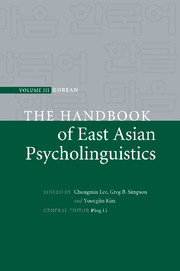Book contents
- Frontmatter
- Contents
- List of figures
- List of tables
- List of contributors
- Preface
- Introduction: Advances in Korean psycholinguistics
- Part I Language acquisition
- 1 Acquisition of the subject and topic nominals and markers in the spontaneous speech of young children in Korean
- 2 The acquisition of argument structure and transitivity in Korean: a discourse-functional approach
- 3 Acquisition of case markers and grammatical functions
- 4 Do Korean children acquire verbs earlier than nouns?
- 5 The acquisition of the placement of the verb in the clause structure of Korean
- 6 Learning locative verb syntax: a crosslinguistic experimental study
- 7 Language-specific spatial semantics and cognition: developmental patterns in English and Korean
- 8 Acquisition of negation in Korean
- 9 The acquisition of Korean numeral classifiers
- 10 Acquisition of Korean reflexive anaphora
- 11 The Korean relative clause: issues of processing and acquisition
- 12 The accessibility hierarchy in Korean: head-external and head-internal relative clauses
- 13 Development of functional categories in child Korean
- 14 The acquisition of modality
- 15 The syntax of overmarking and kes in child Korean
- 16 Events in passive development
- 17 Universal quantification in child grammar
- 18 Acquisition of prosody in Korean
- 19 Korean as a heritage language
- 20 Maturational effects on L2 acquisition
- 21 L2 acquisition of English articles by Korean speakers
- 22 The acquisition of wanna contraction by adult Korean learners of English
- 23 Phonological abilities of Korean–English bilinguals
- 24 Parameters on languages in contact: an altered view of codeswitching
- 25 Influence of socio-psychological categories in bilingual interaction
- 26 Ontological concept versus shape in word learning from a crosslinguistic point of view
- 27 Notes on Korean Sign Language
- Part II Language processing
- References
- Name index
- Subject index
25 - Influence of socio-psychological categories in bilingual interaction
from Part I - Language acquisition
Published online by Cambridge University Press: 05 June 2012
- Frontmatter
- Contents
- List of figures
- List of tables
- List of contributors
- Preface
- Introduction: Advances in Korean psycholinguistics
- Part I Language acquisition
- 1 Acquisition of the subject and topic nominals and markers in the spontaneous speech of young children in Korean
- 2 The acquisition of argument structure and transitivity in Korean: a discourse-functional approach
- 3 Acquisition of case markers and grammatical functions
- 4 Do Korean children acquire verbs earlier than nouns?
- 5 The acquisition of the placement of the verb in the clause structure of Korean
- 6 Learning locative verb syntax: a crosslinguistic experimental study
- 7 Language-specific spatial semantics and cognition: developmental patterns in English and Korean
- 8 Acquisition of negation in Korean
- 9 The acquisition of Korean numeral classifiers
- 10 Acquisition of Korean reflexive anaphora
- 11 The Korean relative clause: issues of processing and acquisition
- 12 The accessibility hierarchy in Korean: head-external and head-internal relative clauses
- 13 Development of functional categories in child Korean
- 14 The acquisition of modality
- 15 The syntax of overmarking and kes in child Korean
- 16 Events in passive development
- 17 Universal quantification in child grammar
- 18 Acquisition of prosody in Korean
- 19 Korean as a heritage language
- 20 Maturational effects on L2 acquisition
- 21 L2 acquisition of English articles by Korean speakers
- 22 The acquisition of wanna contraction by adult Korean learners of English
- 23 Phonological abilities of Korean–English bilinguals
- 24 Parameters on languages in contact: an altered view of codeswitching
- 25 Influence of socio-psychological categories in bilingual interaction
- 26 Ontological concept versus shape in word learning from a crosslinguistic point of view
- 27 Notes on Korean Sign Language
- Part II Language processing
- References
- Name index
- Subject index
Summary
Abstract
This paper addresses the influence of socio-psychological categories on the codeswitching behavior of Korean–English bilingual speakers. While some research has been done on structural constraints on codeswitching, including on Korean–English codeswitching (e.g. J.-E. Park, 1990; J.-O. Choi, 1991; K. K. Yoon 1992), attention to the social factors involved in bilingual interaction has also shed light on such psycholinguistic phenomena as the conceptualization of meaning and interpretation of speech. In this vein, the present discussion surveys the research in codeswitching in conversation (Auer, 1998; Li, 1995, among others) to show how discourse-based studies of codeswitching can provide insights into psycholinguistic issues of interaction.
Gumperz's (1982a, 1992) concept of contextualization involves the use of various contextualization cues that serve as strategies for the expression and interpretation of verbal activities. Among these various cues (e.g. prosodic, gestural, and kinesic cues), codeswitching is identified as another such cue that serves to make relevant certain aspects of the context of interaction. In a detailed analysis of bilingual data, I show how the socio-psychological categories of relative age and status in Korean interaction become contextualized as relevant categories in Korean–English interaction. Observable actions that are mediated through interaction provide evidence for how the switch is produced and interpreted by speakers. This particular codeswitching strategy points to how Korean social categories are conceptualized in Korean–English bilingual discourse and suggests a means of observing the relationship between linguistic codes, cognitive processes, and socio-psychological categories.
- Type
- Chapter
- Information
- The Handbook of East Asian Psycholinguistics , pp. 344 - 350Publisher: Cambridge University PressPrint publication year: 2009



